The Audre Lorde Archival Research Seminar at Spelman College
The Audre Lorde Archival Research Seminar at Spelman College in Atlanta is such a special seminar. This year marks the third offering in three years (2012-2014). Interdisciplinary, it offers Spelman students a full immersion in Audre Lorde’s radical genius. Fellow Spelman professor and poet Opal Moore and I co-created and co-teach it as an honors course. I first got the idea for the Audre Lorde Archival Research Seminar in my second year teaching at Spelman when there was a college wide initiative to develop courses called “Free Thinking Women seminars.”[i] I owe the inspiration to Audre and those who brought her archives to Spelman, Dr. Johnnetta Betsch Cole and Dr. Beverly Guy-Sheftall. Ever since being hired in 2007, I had been trying to find a way to integrate these magnificent archives into a course. Audre was actually the occasion of my first professional visit to Spelman, for a conference remembering Audre Lorde in 2006 put on by Spelman Women’s Research and Resource Center (WRRC) as they were processing the Audre Lorde archives and celebrating the center’s 25th anniversary (Guy-Sheftall 2009). Audre had long been my shero; I felt at home. A home for Audre’s archives seemed like a good home for me. And so when an anthropology teaching position came open, I applied and was hired.
Audre Lorde’s archive had arrived at Spelman in 1995, but were by Audre’s WILL closed until her biography (Deveaux 2004) was finished (Guy-Sheftall 2009). Spelman Women’s Research and Resource Center (WRRC) founder and director Dr. Beverly Guy-Sheftall always stresses that it was primarily due to the friendship between Audre and anthropologist Dr. Johnnetta Betsch Cole (who was Spelman’s first woman president 1987-1997) that Spelman was fortunate enough to be the eventual home to the archive (Guy-Sheftall 2009). So by 2008-9, the archive was nearly finished getting processed but was as yet unopened to the public. Also, as yet, it was unintegrated into Spelman curricula. So I approached poets and fellow professors, Opal Moore and Sharan Strange, to co-develop and co-teach the seminar with me. We worked at it for a few years. Initially the course development initiative was geared toward first year students, and although that would be a great time to begin to acquaint Spelman students with the genius of Audre Lorde, the rigor of the archives led us to develop the seminar as an upper-level honors seminar. We put together an enlarged think tank to brainstorm the seminar with an understanding that it might be fluid as to who actually teaches it, from incarnation to incarnation. It took a few years to shift it toward an upper-level honors course and line up teaching schedules to allow the interdisciplinary co-teaching we had envisioned.
The intent was to intimately showcase a “Free Thinking Women” par excellence using her own archive, one that Spelman was so lucky to have, but which was an underutilized resource of the college. We wanted to make sure Spelman students would know about this incredible resource. This was a resource Spelman students were perfectly positioned to utilize to learn not only Lorde’s Free Thinking methodology but also to potentially contribute cutting edge scholarship regarding a latter 20th century intellectual giant (already one student plans to continue the work for her Ph.D). It was developed to encourage students to consider the way that Lorde’s activism and creative work were grounded in a lifetime of observation, critical engagement and resistance to hegemonic thinking. Audre Lorde gave us one of the clearest routes to breaking silences—she named the unnamed in order to permit us to think beyond permission. She loved and used poetry and critical thinking as ways to articulate our full, multiple and intersectional identities in an ever-broadening process of self-empowerment. As students learned about Lorde’s life and works, they have great opportunities to fully meditate on the significance of her life and work in their own lives.
We finally were able to offer it the first time in fall of 2012. Opal Moore and I eventually co-created and co-taught the seminar, with its first run featuring guest lectures by Sharan Strange and Dr. Alexis Pauline Gumbs. We took a field trip to the Alice Walker archives at Emory University to consider the process of archiving while the writer is still alive and to investigate holdings there, which featured conversations between Audre and Alice. We streamed Hunter College’s Women’s and Gender Studies hosted Audre Lorde celebration that commemorated, like our final forum, the 20th anniversary of Audre’s crossing over. One of the students’ assignments was to self-organize our Audre Lorde forum at term’s end, which was recorded for the archives. Work by two of the students is featured in this Feminist Wire forum. One of them, Banah Gha (2012) made the following artwork poster to advertise the Forum. This is typical of the dedication the seminar fosters, and the skill it summons:
In this Spring 2014 term, we are currently offering it for the third time, and this incarnation features this Feminist Wire online forum (February 18, 2014 through March 1, 2014), commemorating Audre Lorde’s 80th birthday anniversary. We continue our Alice Walker archive comparison at Emory. Dr. Beverly Guy-Sheftall usually introduces the archives or guest lectures. We envision the seminar as a welcome center for visiting Audre Lorde scholars who are invited to guest present to the seminar, and so we often have some planned and some surprise guests. Students in the past have started social media groups to support the work, and already this term a new Audre Lorde Archive Research Seminar Tumblr group has emerged, driven and facilitated by student passion.
We usually try to keep the seminar small so as to not overwhelm the archives. The seminar now meets on the couches in the Women’s Research and Resource Center (WRRC), which prominently features Audre’s portrait as a sort of shrine. It is across the hall from the archives, and we sometimes use a nearby high-tech seminar room which allowing our films and powerpoints. We would sometimes go to the archives as a group but more often (as that tended to overwhelm) students tend to go to the archives on their own, setting up a string of appointments and then checking in to the rest of the seminar each week about their progress. But when we do go as a group it is very focused on a particular theme or era. A special treat for the students is when we open the boxes of Audre’s journals.
Outside the archives, the reading in the seminar center around five books, sometimes all five in a given week as the theme warrants. These provide the basic core of the seminar. The five books are: 1) Zami. A New Spelling of My Name; 2) Sister Outsider: Essays and Speeches; 3) The Collected Poems of Audre Lorde; 4) I Am Your Sister: Collected and Unpublished Writings of Audre Lorde, and 5) WarriorPoet: A Biography of Audre Lorde. There is a lot of reading and writing, creative and analytical. And yet although it’s a very demanding Honors seminar, its shero sometimes attracts even first year students who, courageous and top-notch, are willing to take the toughest seminars in order to engage with this material as soon as possible.
Some units reconsider the many complexities of Audre’s intersectionality from Caribbean postcolonial perspectives, and ground them in Grenadian specifics via the presentation of a new gathering of Audre’s Grenadian (and Carriacouan) genealogy. In general, we explore arguments for greater inclusion of Lorde, her work and legacy, in postcolonial Caribbean conversations. We analyze archival documents from Lorde’s Grenada visits and work which she undertook after her diagnosis with cancer, and highlight her comparisons of the 1983 U.S. invasion of Grenada with the cancer invading her own body. We contextualize Grenadian “zami” traditions in the broader Circum–Caribbean by bringing in two anthropological case studies—“mati“ from Suriname (Wekker 2006) and the more recent “flipping” in New Orleans (Wilson 2009), that demonstrate the alterity and diversity of Afro-Caribbean female same-sex unions.
Finally being able to make a seminar around these special archives at Spelman has been one of the greatest honors and privileges of my life. We all learn so much from Audre, and each other. All who have the fortune of interacting with her archives are enlivened by it, and the ripples keep spreading outward. Making this seminar a staple at Spelman is one step in further empowering Spelman students to develop the tools that can actuate Spelman’s motto of “a choice to change the world.”
Bibliography:
Guy-Sheftall, Beverly. 2009. “Bearing Witness: The Legacy of Audre Lorde” In I Am Your Sister: Collected and Unpublished Writings of Audre Lorde. Byrd, Rudolph P., Johnnetta Betsch Cole, and Beverly Guy-Sheftall. (Eds). Pp253-260. Oxford University Press, USA.
Byrd, Rudolph P., Johnnetta Betsch Cole, and Beverly Guy-Sheftall. (Eds). 2009. I Am Your Sister: Collected and Unpublished Writings of Audre Lorde (Transgressing Boundaries: Studies in Black Politics & Black Communities). Oxford University Press, USA.
Lorde, Audre. 1982. Zami. A New Spelling of My Name. The Crossing Press. (autobiography)
____. 1984. Sister Outsider: Essays and Speeches. The Crossing Press.
____. 2000. The Collected Poems of Audre Lorde. W. W. Norton & Company.
De Veaux, Alexis. 2006 WarriorPoet: A Biography of AudreLorde. W.W. Norton & Co.
Wekker, Gloria. 2006. The Politics of Passion: Women’s Sexual Culture in the Afro-Surinamese DiasporaNew York, Columbia University Press.
Wilson, Natasha. 2009. “A Queer Situation: Poverty, Prisons, and Performances of Infidelity and Instability in the New Orleans Lesbian Anthem” In Out in Public: Reinventing Lesbian / Gay Anthropology in a Globalizing World. Pp104-122. Blackwell Publishing Ltd. Available online
__________________________________
Dr. Jerry Wever, Assistant Professor of Anthropology at Spelman College in Atlanta, is a Cultural Anthropologist and Ethnomusicologist from N.Y., USA. He teaches the Audre Lorde Archival Research Seminar at the Audre Lorde archives at Spelman together with Spelman professor and poet Opal Moore. His Ph. D. is from the Dept. of Anthropology at University of Iowa, where he enrolled to be in the only Ph.D. program in feminist anthropology. There he was a formative part of the Caribbean, Diasporas, Atlantic Studies Program. His work is on globalization, sustainability, postcolonial thought, creolization and cultural decolonization in the French Creolephone Caribbean and Indian Ocean (in St. Lucia in the Caribbean, and Seychelles / Chagos in the Indian Ocean). His U.S. work focuses on New Orleans, social justice and whiteness. He also teaches Earth (the seminar): Sustainability; Anthropology of Globalization and Social Inequalities; African Diaspora and the World (ADW); Social Histories of Caribbean Musics: An Anthropology of Music and Globalization; Seminar in Caribbean Anthropology; and Advanced Seminar in Ethnomusicology.
Dr. Jerry Wever, Assistant Professor of Anthropology at Spelman College in Atlanta, is a Cultural Anthropologist and Ethnomusicologist from N.Y., USA. He teaches the Audre Lorde Archival Research Seminar at the Audre Lorde archives at Spelman together with Spelman professor and poet Opal Moore. His Ph. D. is from the Dept. of Anthropology at University of Iowa, where he enrolled to be in the only Ph.D. program in feminist anthropology. There he was a formative part of the Caribbean, Diasporas, Atlantic Studies Program. His work is on globalization, sustainability, postcolonial thought, creolization and cultural decolonization in the French Creolephone Caribbean and Indian Ocean (in St. Lucia in the Caribbean, and Seychelles / Chagos in the Indian Ocean). His U.S. work focuses on New Orleans, social justice and whiteness. He also teaches Earth (the seminar): Sustainability; Anthropology of Globalization and Social Inequalities; African Diaspora and the World (ADW); Social Histories of Caribbean Musics: An Anthropology of Music and Globalization; Seminar in Caribbean Anthropology; and Advanced Seminar in Ethnomusicology.
[i] These were called for by our Teaching Resource and Research Center (TRRC) directed by Dr. Mona Phillips.

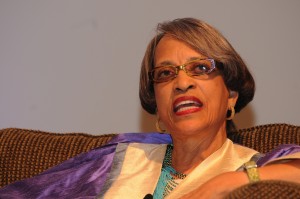
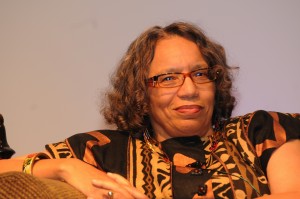
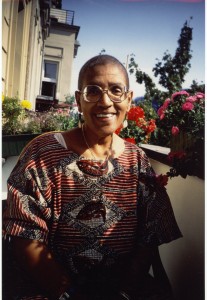
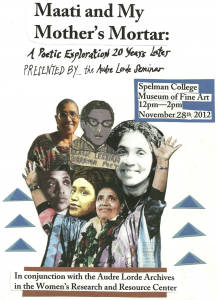
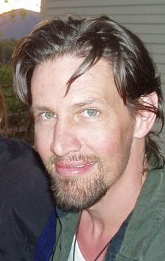

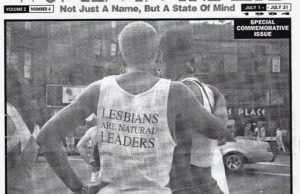

Pingback: Afterword: Standing at the Lordean Shoreline - The Feminist Wire | The Feminist Wire